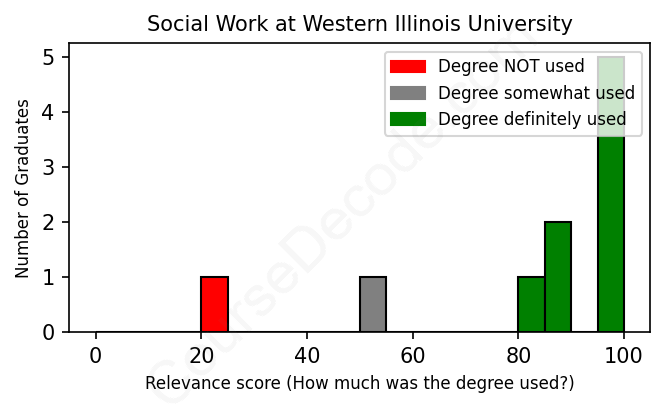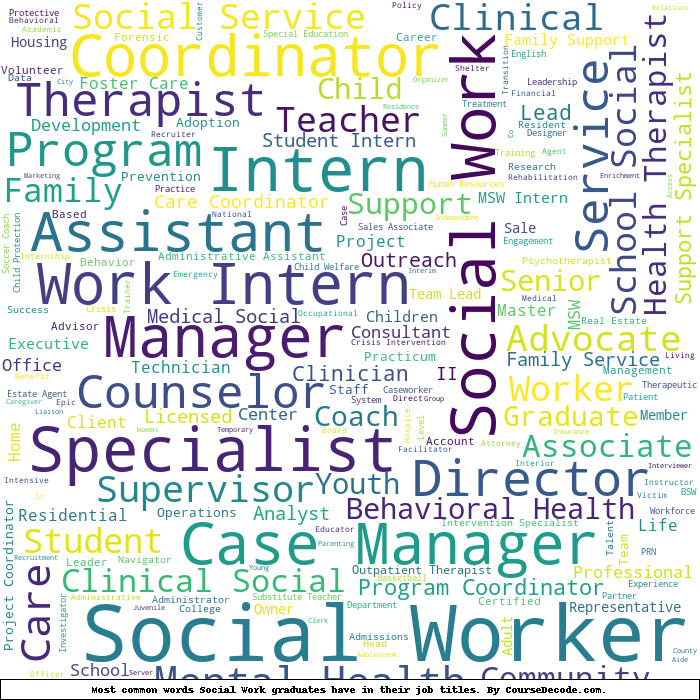
First, some facts. Of the Social Work graduates from Western Illinois University we've analyzed , here's how many have used (or NOT used) their degree in their career:

These are estimates based on AI analysis of 10 LinkedIn profiles (see below).
The verdict? Significantly above average. Overall, with an average relevance score of 82%, Social Work graduates from Western Illinois University have a much higher likelihood (+15%) of finding work in this field compared to the average graduate across all fields:
And for comparison, here's the chart for all profiles we've looked at across all degrees.
Also, after graduating, 70% of these graduates have pursued further education other than another Bachelor's degree (such as a Masters degree or other), compared to the average across all profiles of 35%. This suggests you may need more than just a Bachelors degree to be competitive as a Social Work graduate.
See the details:
|
Relevance score: 100% We think this person has gone into a career highly relevant to their degree. We think this person has gone into a career highly relevant to their degree.
DEGREE INFOGraduated in 2015 from Western Illinois University with a Bachelors Degree in Social Work. Also pursued further education since (see below). JOB HISTORY SINCE GRADUATIONCase Manager Intern Samaritan Well Jan 2015 - May 2015 Case Manager Intern  ChildServ Jan 2016 - Aug 2016 Youth Care Worker  ChildServ Aug 2015 - Present FURTHER DEGREES DONE SINCE GRADUATINGMasters DegreeAurora University 2015 - 2016 ABOUTI possess a Master's Degree in Social Work from an Accredited School of Social Work. I have worked within a variety of settings with diverse individuals providing me with numerous and valuable experiences. My career has given me the ability to independently conduct assessments and provide help to a wide variety of individuals from various socio-economic, cultural, ethnic, educational and other diversified backgrounds. My abilities allow me to utilize community resources and provide education to those in need is essential for a Social Worker. My assessment and treatment skills help prepare families with a wide range of social, emotional, and health related problems. I have collaborated with health care professionals such as doctors, nurses, case managers and spiritual care. I have evaluated the social and emotional needs of families to determine the types of social services needed. |
The top 10 most common jobs done by the graduates we've analyzed (ranked most common to least) are:
When we look at the types of jobs that graduates with a Social Work degree from Western Illinois University have gotten into, a pretty clear pattern emerges. Many of them have taken on roles like Academic Advisors, Student Support Coaches, and various positions related to child welfare, counseling, and mental health. These positions often require skills and knowledge that are closely related to social work, like providing emotional support, guiding individuals through challenges, and sometimes even managing cases. For instance, jobs like Clinicians and Mental Health Therapists show a strong link to the skills gained through their education, confirming that many graduates indeed use their degree in their careers.
However, it's important to note that not every position held by these graduates is directly relevant to social work. Some roles, like Patient Access Coordinator or Social Media Marketing Manager, might draw on certain transferable skills but are primarily outside the realm of social work practice. So, while a good chunk of graduates end up in relevant fields that align well with their training, there are also several who have taken paths that don’t fully utilize the specific skill set of social work. Overall, it seems like many alumni are leveraging their education effectively, but there’s also a mix of careers that don’t directly relate to what they studied.
Here is a visual representation of the most common words in job titles for Social Work graduates (this is across all Social Work graduates we've analyzed, not just those who went to Western Illinois University):

Graduates from the Social Work program at Western Illinois University generally seem to follow a career trajectory that aligns closely with the core values of social work. Many of them start out in entry-level roles that directly relate to their degree. For instance, recent graduates often kick off their careers with internships or positions like Case Manager Intern or Child Welfare Specialist. It’s common to see these individuals transitioning into roles that involve direct client support, case management, or academic advising, which shows they’re putting their education to use effectively right after graduation.
Looking further down the line, about 5 to 10 years later, many alumni continue to grow in positions that deepen their impact in the field. They often become licensed therapists, clinicians, or specialists in child welfare, indicating a professional investment in social and mental health services. Even those who started in more administrative or academic support roles tend to gravitate back toward the social services field, often with a focus on advocacy or direct care, which suggests long-term commitment to their profession. Overall, while there are some who veer into unrelated fields, it appears that a substantial number of Western Illinois University social work graduates find fulfilling, relevant careers that utilize and expand upon their initial training and experiences in social work.
Honestly, a Bachelor’s degree in Social Work can be a bit challenging, but it really depends on your interests and strengths. At Western Illinois University, like at many other schools, you’ll dive into a mix of theory, practical skills, and hands-on experience, which can get pretty intense. You’ll definitely need to stay organized and manage your time well, especially when juggling coursework, field placements, and projects. The classes can be emotionally demanding too, since you’ll be discussing some heavy topics related to social issues and human behavior. But if you’re passionate about helping others and really engage with the material, it can actually be a rewarding experience, and you might find it easier than you think!
Most commonly, in the LinkedIn profiles we've looked at, it takes people 4 years to finish a Bachelor degree in Social Work.
From the looks of it, these Western Illinois University grads in social work have had pretty typical earnings for their field, which isn’t exactly known for high salaries. Many of them started in roles like academic advising and case management, which usually offer decent but not high pay, especially for entry-level positions. It's also common for social work professionals to move around a lot, chasing better opportunities or advancing their careers—like the grad who's moved from a support coach to a senior position at Noodle. Some are climbing the ladder into roles like clinicians and psychotherapists, which can offer better pay. Overall, they seem to be doing okay, but I wouldn't say they're rolling in it—it's a solid path, but still more about helping others than cashing in.
Here is a visual representation of the most common words seen in the "about" section of LinkedIn profiles who have a Bachelor degree in Social Work (this is across all Social Work graduates we've analyzed, not just those who went to Western Illinois University). This may or may not be useful:

Here are all colleges offering a Bachelor degree in Social Work (ordered by the average relevance score of their Social Work graduates, best to worst) where we have analyzed at least 10 of their graduates: